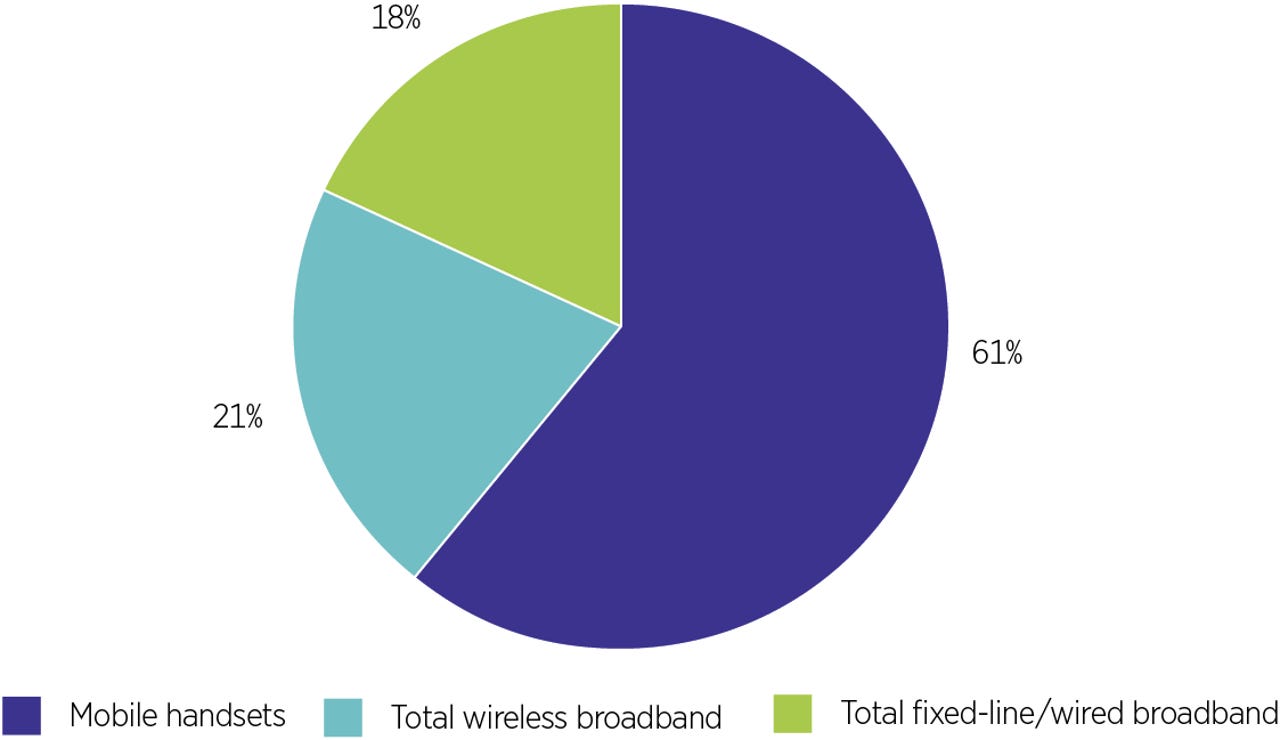Australia has 24.3m active retail mobile services: ACCC

Mobile handsets are Australia's most used service in operation (SIO) for internet activity, according to the Australian Competition and Consumer Commission's (ACCC) new internet activity report.
The new report [PDF] will be released biannually and provides information on the number of retail SIOs, download speeds, as well as the volume of data downloaded within Australia. It replaces the now-discontinued Internet Activity Survey that was conducted by the Australian Bureau of Statistics (ABS).
There were around 39.9 million retail SIOs as of 31 December 2018, which comprised of 24.3 million mobile handsets, 8.4 million wireless broadband connections, and 7.2 fixed-line and wired broadband connections. The current population of Australia is around 25.4 million.

Proportion of retail SIOs by type of access connection
Fibre accounted for the largest proportion of fixed line and wired connection SIOs at 49%, DSL accounted for 34%, and 17% were cable connections.
While mobile handsets were the most used form of SIO as at the end of last year, fixed-line and wired technologies were used for 91% of the total volume of data downloaded, followed by mobile handsets at 6%, and wireless broadband at 3%.
The total volume of data downloaded in the three months to 31 December 2018 was 5.1 million terabytes.
"This report provides a clear indication that while consumers are most often using their phones to access the internet, when downloading significant content they currently favour fixed line connections," ACCC Commissioner Cristina Cifuentes said.
The ACCC also expects the amount of data downloaded to grow exponentially, according to Cifuentes, as content streaming services such as Netflix and social media platforms such as Facebook are being used more prevalently.
According to the report, 61% of consumers using fixed-line and wired and wireless broadband SIOs had internet speeds that were less than 24 megabits per second (Mbps), while 25% of these SIOs had internet speeds of between 24Mbps to 50Mbps, and 8% had 50Mbps to 100Mbps speeds. Only 5% of fixed-line and wired and wireless broadband SIOs had internet speeds greater than 100Mbps.
The next internet activity report will be released for data as at June 2019 and will have additional information, including: Total retail broadband SIOs grouped by NBN and non-NBN; retail broadband non-NBN SIOs disaggregated by type of access technology; retail broadband NBN SIOs disaggregated by wholesale speed tiers; mobile SIOs disaggregated by prepaid, post-paid, and mobile broadband at both a wholesale and retail level; the number of retail broadband and mobile SIOs with no data download limits; and the volume of data downloaded disaggregated by NBN wholesale speed tiers and non-NBN access technologies.
The ACCC also revealed last week that TPG had claimed first place for the third consecutive time in its fifth broadband speed-monitoring report. 89% of TPG's plans were able to deliver maximum plan speeds overall and 88% during busy hours for downloads in the first measurements for 2019.
Related Coverage
ACCC opposes TPG and Vodafone Australia merger
Consumer watchdog rejects deal to create new telco worth AU$15 billion.
ACCC questions fairness of NBN basic pricing
With the gap between basic 12Mbps plans and 50Mbps plans closing, the ACCC questions the fairness of NBN plans compared to existing ADSL plans.
ACCC and Telstra want to maintain stable price structure for copper services
They believe a similar price structure will provide a more stable environment for access seekers as customers migrate to the NBN.
TPG is still king of NBN speed report
TPG still delivers on its download speed promises the most often, while Exetel won on upload speeds, Telstra on latency, and Optus on the highest number of daily outages, according to the fifth ACCC report.
Labor faces reality on NBN but the dream died long ago
Liberal party may crow that its version of the NBN won out, but that's because it oversaw the network for most of its life.
5G mobile networks: A cheat sheet (TechRepublic)
As LTE networks become increasingly saturated, mobile network operators are planning for the 5G future. Here is what business professionals and mobile users need to know about 5G networks.